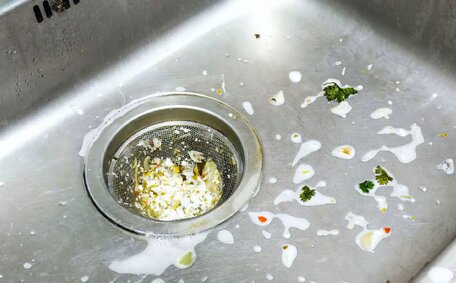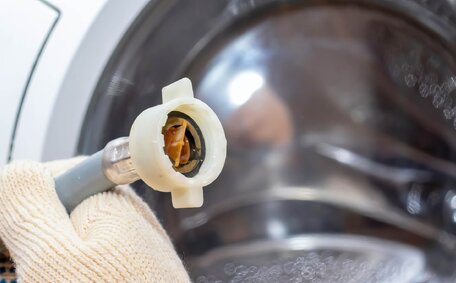Introduction to blocked drains
Blocked drains pose a frequent challenge for both households and businesses in Burwood, Sydney. A clogged drain can disrupt daily life and operations, causing flooded sinks, foul odours, backed up pipes, and other inconvenient plumbing problem scenarios. At Burwood Plumbing, we tackle the underlying issues of blocked drains to restore unimpeded water flow.
The main causes of blocked drains include built-up grease and food scraps in the kitchen, tree roots in drainage pipes, or flushed objects obstructing the water flow. Comprehending the primary reasons for drain blockages equips Burwood residents and businesses with the knowledge to prevent them.
Our guide delves into the main factors leading to clogged drains, their warning signs, and advice on DIY remedies.
Common household items that cause blockages
- Hair - Accumulated hair strands can entangle, leading to clogs that hinder flow in drainage pipes.
- Food scraps - Particles washed down the drain can accumulate and contribute to blockages.
- Tree roots - Exterior pipes can be infiltrated by tree roots over time.
- Sanitary items - Items like sanitary pads, tampons, condoms, and cotton buds should be disposed of in the trash, not flushed down the toilet, for effective blockage prevention.
- Paper products -
- Excess dirt and sediment - Dirt or mineral deposits can accumulate over time, requiring intervention to clear.
Despite their diminutive size, such items can amass within pipes, obstructing water flow and resulting in blockages. Being mindful of materials disposed of via drains is key to averting blockages.
Grease and fat
Gradual build-up of grease and fat in drain pipes can eventually obstruct water flow and cause blockages.
Grease cools, congeals, and forms solid lumps in pipes, causing blockages.
The sewer line transports wastewater over long distances, enabling grease more time to cling and harden along the way.
Pouring grease down kitchen sinks puts businesses at risk of significant grease accumulation and blockages in subfloor piping. Grease adhering to the interior of pipes leads to a progressive narrowing of their diameter, culminating in full blockages.
To mitigate blockages, refrain from washing grease or fat residues from cookware down sinks or drains. To mitigate blockages, refrain from washing grease or fat residues from cookware down sinks or drains. In case of grease clogs, a combination of drain cleaner and boiling water can effectively resolve kitchen drain blockages.
To handle grease residues, wipe them with paper towels and dispose of them in the trash.
Hair
Hair frequently stands as a principal offender for drain blockages. Daily shedding leads to hair accumulating within pipes, intertwining to form blockages. As additional debris passes through,
Hair from baths can cling to sticky pipe interiors, exemplifying typical blockages and indicating potential fixes. Over time, clumps of hair and soap scum can end up accumulating in pipes, disrupting your home’s drainage. Hair can also entangle with inadvertently flushed items, aggregating materials that may clog your
Drain covers and strainers act as effective preventative tools, intercepting hair before it enters the drainage system. Yet, regular cleaning of strainers is necessary as accumulated hair can lead to gradual build-up. Observing bathroom drains for diminished water flow offers early indications of potential blockages, assisting in the identification and removal of hair-related clogs.
Tree roots
Tree roots that infiltrate drainage systems can become significant contributors to blocked drains, particularly in verdant areas like Burwood. Roots seeking moisture underground often find their way into fissures or defective joints in outdoor drainage pipes.
Tree roots take advantage of weaknesses in ageing pipelines with cracks and loose fittings, integral to your property’s plumbing infrastructure. Property owners should be aware that roots penetrate aged earthenware pipes more readily than modern PVC, but plastic pipes are still vulnerable over time.
These hairy root masses then capture passing debris, causing a complete blockage.
It’s essential to manage vegetation close to drainage lines, with vigilant monitoring and trimming of tree root growth near pipes.
Moreover, ensure your drainage systems are free from cracks or leaks that can permit root entry. Given the rapid encroachment of tree roots, prompt detection and professional drain repairs are crucial. Regular yearly drain inspections also facilitate the discovery and clearance of minor root intrusions before they escalate.
A professional inspection of your plumbing system may be necessary for severe drain blockages.
We advocate for engaging a certified plumber, adept in using high-pressure jet cleaning and mechanical augers, to address stubborn tree root blockages in your pipes. While complete root extraction offers a long-term solution, pipe reparations are frequently necessary to avert reoccurrences. Prompt action on tree roots in drains is advised, with your local Burwood Plumbing experts at the ready to assist.
Foreign objects
Toys and miscellaneous household items that fit down sinks commonly lead to blocked drains. Even seemingly small objects can become lodged in drainage pipes, causing stalled water flow and build-up.
Items that are put down the drain can commonly contribute to clogged drains, including:
- Kids’ toys, small balls or marbles
- Kitchen utensils like spoons or vegetable peelers
- Toothbrushes, toothpaste tubes
- Hair accessories like combs and barrettes
- Jewellery like earrings or rings
- Coins, buttons, pins, nails, screws
- Children’s artwork, stickers and more
While convenient at the moment, flushing foreign objects into drains typically results in blockages and subsequent plumbing problems. Educating children and other household members on correct drain usage is a vital preventive measure.
Should you encounter an obstruction from a flushed object, difficult to remove, we recommend a professional plumbing inspection. Drain augers or high-powered hydro jetting may be necessary to dismantle a solid obstruction. Occasionally, it might be essential to partially disassemble pipes and remove or replace damaged sections if an object is tightly lodged.
How blockages form over time
Accumulation of debris, mixing with substances such as grease and mineral deposits, gradually narrows pipes by clogging them.
Slower draining in sinks, tubs, and toilets, requiring more time to empty, may signal a blockage. Unusual odours emanating from drains could also signal a blockage. Backups, where water is expelled from one drain as another is in use, often herald the onset of blockages.
What food waste or hair gets washed down which drains?
Observing how each sink is utilised can help identify areas prone to problems.
Pipe issues that can cause obstructions
Issues with pipes, due to their specific conditions, often contribute to drain blockages. Ageing and deteriorating pipes become susceptible to problems as cracks, leaks, and corrosion create entry points for roots and debris. 'Why are my drains problematic?' one may ask, with an answer often found in the mineral deposits that accumulate in older pipes over many years.
Common pipe problems leading to clogged drains include:
- Burst pipes from tree roots or shifting foundations
- Leaky pipe joints allowing sediment and roots to enter
- Corroded galvanised iron or copper pipes with reduced diameter
- Build-up of hard water mineral deposits narrowing plastic and earthenware pipes
Hair, soap residue and other debris that can block up pipes cause further cling to these obstructions inside deteriorated pipes, creating a more severe blockage. Additionally, food waste sticks to the greasy residue lining pipe walls, raising the question of how to address this typical issue. Effectively preventing clogged drains reoccurrence depends on addressing damage via pipe repair and replacement.
Plumbing systems with older pipes generally experience more degradation and blockages. Moreover, pipes installed 30-50 years ago are now commonly failing in Sydney homes, frequently attributable to a lack of regular checks. Should you notice a decline in water flow, have your Burwood pipes inspected to forestall clogs and backups.
Preventing drain blockages
Adopting a few strategic practices can effectively prevent drain clogs in your Burwood home or business:
Regular drain maintenance
Cultivate the weekly habit of pouring half a cup of baking soda followed by half a cup of vinegar down the drains to combat buildup. This chemical reaction helps to dissolve the buildup, while periodic flushing with boiling water maintains clear pipes.
Install drain screens/strainers
Installing screens on sink, tub, and shower drains catches debris, even minuscule particles, before they enter the pipes. Screens should be cleaned regularly to avoid excess hair/soap accumulation.
Proper disposal habits
Instruct household members and workers to only flush toilet paper and bodily waste down toilets, while avoiding misplacing wipes and other non-flushable items. Dispose of all food scraps and fat or oil residues in the bin, not down sink drains.
Monitor outdoor drains
Periodically check the condition of outdoor drain pipes and prune intrusive tree branches or roots to prevent subterranean blockages.
Address leaks early
Fix dripping taps and faulty pipe joints as soon as detected to prevent moisture damage enabling debris and roots to penetrate pipes.
In the event of recurrent severe blockages, contact a professional at 1300 349 338 for drain inspection and solution identification.
Resolving minor vs major blockages
When tackling drain unblocking, the strategy varies depending on whether it’s a minor or significant clog. Effectively managing minor blockages involves addressing them personally before the situation escalates into major issues necessitating professional help.
Clearing minor blockages
For partial obstructions or small clogs, homeowners can use a few home remedies, such as:
- Utilise a robust plunger to forcefully dislodge clogs
- Pour a pot of boiling water down the impacted drain to dissolve grease accumulations
- Utilise chemical drain cleaners, with ingredients like caustic soda or citric acid, to effectively overcome minor blockages
- Employ a drain snake or hand-operated drain auger to manually extract hair and debris causing the blockage
Professional assistance for major blockages
Extensive obstructions in your home’s sink, tub, and floor drains often demand a professional plumbing inspection and specialised drain cleaning tools.
Signs of a severe clog include overflowing drains, sewerage backflows, and slowed communal drainage affecting multiple outlets on the property. For severe clogs, Burwood Plumbing’s team uses industry-grade hydro jetting and camera technology.
For immediate assistance with urgent drain problems, reach out to our emergency plumbers at 1300 349 338.






